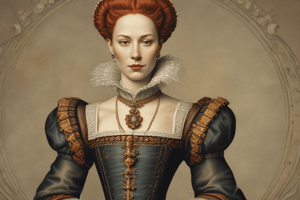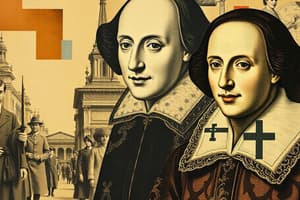Podcast
Questions and Answers
Who ruled England and Ireland during the Elizabethan Era?
Who ruled England and Ireland during the Elizabethan Era?
- Queen Anne
- Queen Mary
- Queen Victoria
- Queen Elizabeth I (correct)
What significant cultural and economic changes marked the Elizabethan Era?
What significant cultural and economic changes marked the Elizabethan Era?
- Expansion of the British Empire (correct)
- Increase in religious unity
- Decline of the British Empire
- Collapse of the arts and literature
Which literary figure exemplified the flourishing arts during the Elizabethan Era?
Which literary figure exemplified the flourishing arts during the Elizabethan Era?
- William Shakespeare (correct)
- John Milton
- Geoffrey Chaucer
- Francis Bacon
What was the primary question at the center of the English Civil Wars?
What was the primary question at the center of the English Civil Wars?
Which period in British history saw the struggle between monarchical rule and the eventual triumph of democracy?
Which period in British history saw the struggle between monarchical rule and the eventual triumph of democracy?
In the context of British history, what period followed the Elizabethan Era?
In the context of British history, what period followed the Elizabethan Era?
What term was used to refer to the supporters of the Crown during the English Civil War?
What term was used to refer to the supporters of the Crown during the English Civil War?
Who was the ruler of England during the Glorious Revolution of 1688?
Who was the ruler of England during the Glorious Revolution of 1688?
What practice did women in Elizabethan society risk their lives for in pursuit of the 'perfect' Tudor face?
What practice did women in Elizabethan society risk their lives for in pursuit of the 'perfect' Tudor face?
Who governed the Commonwealth after the execution of Charles I during the English Civil War?
Who governed the Commonwealth after the execution of Charles I during the English Civil War?
What marked the end of the Stuart Period and paved the way for the restoration of the monarchy in 1660?
What marked the end of the Stuart Period and paved the way for the restoration of the monarchy in 1660?
What group of individuals continued to grow despite laws passed against them by William III following Mary II's early death?
What group of individuals continued to grow despite laws passed against them by William III following Mary II's early death?
Flashcards are hidden until you start studying
Study Notes
History of Britain
Britain is a land steeped in history, with its story spanning thousands of years from ancient times until today. This narrative includes tales of empires rising, wars fought, and cultures evolving. In this exploration of the country's past, we will delve into several key periods, starting with the Elizabethan Era and concluding with the struggle between monarchical rule during the Stuart Period and the eventual triumph of democracy during the English Civil War.
Elizabethan Era
The Elizabethan Era, named after Queen Elizabeth I who ruled England and Ireland from 1558 to her death in 1603, was marked by great cultural and economic changes. During this time, the British Empire began to expand significantly, leading to new sources of wealth and power for the nation. It also saw a flourishing of arts, particularly drama and poetry, exemplified by the works of William Shakespeare. Additionally, it was characterized by religious conflicts stemming from the Reformation, which had split Christianity into different factions such as Protestantism and Catholicism.
English Civil War
Fast forwarding to the mid-seventeenth century, we encounter one of the most tumultuous periods in Britain's history - the English Civil Wars of 1642–1651. These were a series of battles fought over the question of whether the King of England has divine right or if his subjects have rights equal to him under God. On one side stood those loyal to the Crown, known as Royalists, while their opponents, called Parliamentarians or Roundheads, sought to remove royal powers. Eventually, the conflict led to the execution of Charles I and the establishment of the Commonwealth, governed by Oliver Cromwell. However, this regime eventually collapsed when Cromwell died without naming a successor, paving the way for restoration of the monarchy in 1660.
Stuart Period
With the return of the house of Plantagenet came the Stuart dynasty whose reign lasted until 1714. Kings like James II attempted to restore Roman Catholicism as the state religion despite strong opposition including the Glorious Revolution of 1688 where he was replaced by William III of Orange and Mary II. After Mary's early death, William became sole ruler and began to pass laws against Dissenters – nonconformist Protestants who did not attend Anglican churches. Despite these restrictions, dissent continued to grow, especially among lower classes, setting the stage for future political unrest.
Perfect Tudor Face
Now let us shift gears slightly toward a more peculiar aspect of British history – the pursuit of achieving what many believed to be the 'perfect' Tudor face. Personal appearance mattered greatly in Elizabethan society, so much that women would risk their lives altering their faces through various methods, often resulting in infections or even death. For men, beard growth symbolized maturity and status within the courtly system; while shaved chins denoted youthful knights still waiting for glory on the battlefield.
In conclusion, Britain's tale reflects countless struggles and achievements throughout centuries. From the grandeur of imperial expansion during the Elizabethan Era to the profound ideological clashes embodied in the English Civil War and Stuart Period, each phase contributed to shaping the nation we know today. Furthermore, although lesser-known compared to major historical events, an interest in personal grooming practices provides another fascinating layer to understanding life during that epoch.
Studying That Suits You
Use AI to generate personalized quizzes and flashcards to suit your learning preferences.





